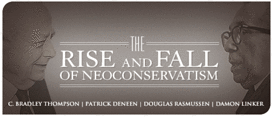I would like to respond for myself in regard to the following two claims Damon Linker’s makes in Strauss, Nationalism, and Fascism:
1. “On capitalism, here I think Thompson (along with Douglas Rasmussen) and I just begin from very different assumptions. They tend to believe that any moral or even utilitarian critique of autonomous capitalism implies a hatred of capitalism, whereas I think autonomous capitalism is neither possible nor desirable.”
I am not sure why Linker thinks that I tend to believe any moral or even utilitarian critique of autonomous capitalism implies a hatred of capitalism. I said no such thing, and I don’t know how he can legitimately make such a claim. Linker cites nothing I have written in this forum or elsewhere. Moreover, “hatred” is a strong word, and I tend not to use it lightly.
2. “We simply begin with different assumptions and interpretations of the world we live in.”
Of course we do, and that is why we are having this conversation. Since I am an academic, a professor, a philosopher, an “egg-head,” I try to think carefully about these matters. But so do others. I assume Damon Linker does. So, I would like to know the following: (a) what Linker means by “autonomous” capitalism; (b) why he thinks it is neither possible nor desirable; and (c) what is his standard for determining desirability. Moreover, we can talk about this in terms of ideal types or actually existing systems. This discussion can be done on ethical, political, social, cultural, and even religious grounds.
Linker can have his opinions. I can have mine, but what we are after is what is true and why. Is not that what we care about? If not, then let’s make that the topic of discussion.

